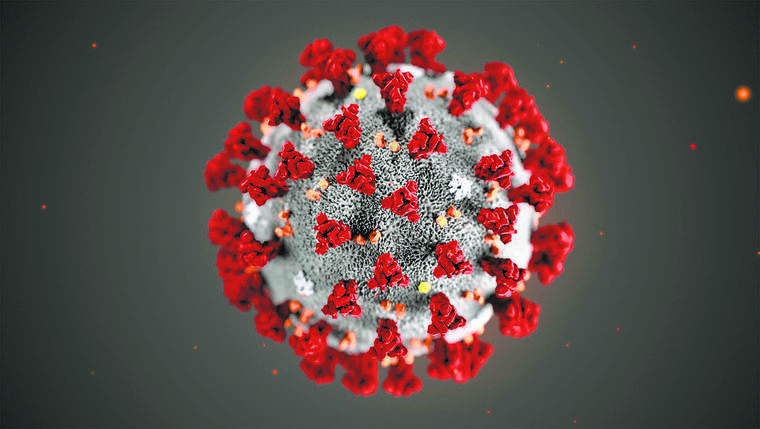Lawmakers hold briefing on coronavirus outbreak

This illustration provided by the Centers for Disease Control and Prevention in January 2020 shows the 2019 Novel Coronavirus (2019-nCoV). This virus was identified as the cause of an outbreak of respiratory illness first detected in Wuhan, China. (CDC/Via AP)
There have been no confirmed or suspected cases of the coronavirus in Hawaii, but the global outbreak is still a concern for state leaders.
There have been no confirmed or suspected cases of the coronavirus in Hawaii, but the global outbreak is still a concern for state leaders.
The state House Committee on Health on Monday heard updates from the state Department of Health, the state Department of Transportation and the Healthcare Association of Hawaii in regards to an ongoing outbreak of the 2019 novel coronavirus — caused by a previously unidentified coronavirus first detected in Wuhan, Hubei province, China, on Dec. 31.
Screening is being conducted at Daniel K. Inouye International Airport in Honolulu to monitor for travelers with symptoms. The airport is one of 11 designated to receive U.S. citizens who have traveled in China within the past 14 days.
When asked about the screening process, state epidemiologist Sarah Park said screenings are being done by U.S. Customs and Border Protection in collaboration with the U.S. Centers for Disease Control and Prevention.
According to Park, customs agents ask travelers if they’ve been to China and when, and those who have will be sent to CDC staff for screening.
Someone traveling from Wuhan will go into mandatory quarantine, “regardless of symptoms or not.”
However, Park said by midweek, the number of travelers from Wuhan will be zero because of lockdowns in and around the city in place for nearly two weeks.
The U.S. on Friday also put travel restrictions on people traveling from China in an attempt to limit the spread of the virus.
According to the DOH, there are no direct flights from Wuhan to Hawaii. The Star-Advertiser reported Monday that China Eastern Airlines, which was the only airline providing direct flights between China and Hawaii, had suspended flights to the state.
Lt. Gov. Josh Green, a Big Island physician, said that Hawaii has only a modest health care system and can’t be a hub for accommodating people potentially exposed to the rapidly spreading new virus, the Associated Press reported.
He said the state only has the capacity to handle its own citizens and basic screening unless it gets significant support from the military.
“We are happy to do our part but only modestly as needed for very sick people or for our citizens,” Green said, according to the AP.
On Monday, the military made a quarantine site at Pearl Harbor available, Bruce Anderson, the director of the state DOH, told lawmakers, according to the Associated Press.
Should someone end up in quarantine and fall ill, Park told lawmakers the DOH would ensure the individual received appropriate health care and remain in isolation as long as the CDC requires, a still undetermined number of days.
If they recover from their required medical care, Park said the DOH would work with the individual, their health care provider and possibly family to ensure they go to a secure home and remain in isolation at home, where the patient would continue to be monitored in collaboration with the CDC and other community partners.
“Again (this scenario) is constantly changing,” Park said. “I think the strength of what we do is in our partnerships, and we have been having ongoing conversations with all the critical partners.”
Common coronaviruses in humans usually cause mild to moderate upper-respiratory tract illnesses, like the common cold, according to the CDC.
Symptoms of the newly identified virus include mild to severe respiratory illness with fever, cough and difficulty breathing. At this time, the CDC believes symptoms might appear 2-14 days after exposure.
By Monday afternoon, more than 20,000 cases have been confirmed and there have been more than 420 deaths, mostly in mainland China. Cases have been reported in more than 25 countries, including 11 in the U.S.
State health officials also have met with Hawaii’s mayors to talk about protective protocols in place for the coronavirus, the committee was told.
Mayor Harry Kim confirmed there have been discussions about the virus between Hawaii County leaders, the DOH, state emergency management officials and others regarding the outbreak.
According to Kim, a second teleconference was held Monday, and another will be held Wednesday.
The purpose, he said, is to make sure information going out is coordinated, “so we all sing the same song.”
Kim said people should know about the virus to dispel misinformation about it, and they should know what the government is doing about the outbreak.
The county Civil Defense Agency has been instructed to make daily updates regarding the outbreak, he said.
Additionally, the county is preparing informational pamphlets that will be ready for distribution “hopefully before the weekend.”
“This is a new virus, and we’ve had new viruses affect this world before,” Kim said, adding that he’s “appreciative of all government units trying to contain it from spreading even more … .”
Park also said one of the main challenges is combating misinformation circulating in the community.
“In my years of experience with each event, I see the rise of social media is honestly a real challenge for those of us working in public health,” Park said, adding that addressing the misinformation diverts critical resources.
She encouraged people to fact check information found on social media against the DOH and CDC websites.
Misinformation is harmful to Hawaii’s communities “because it’s not getting the important messages out. We need to, as a community, prepare for the eventual likelihood that this virus will be in our communities, and we need to make sure the information is out there in terms of how we can combat it now.”


